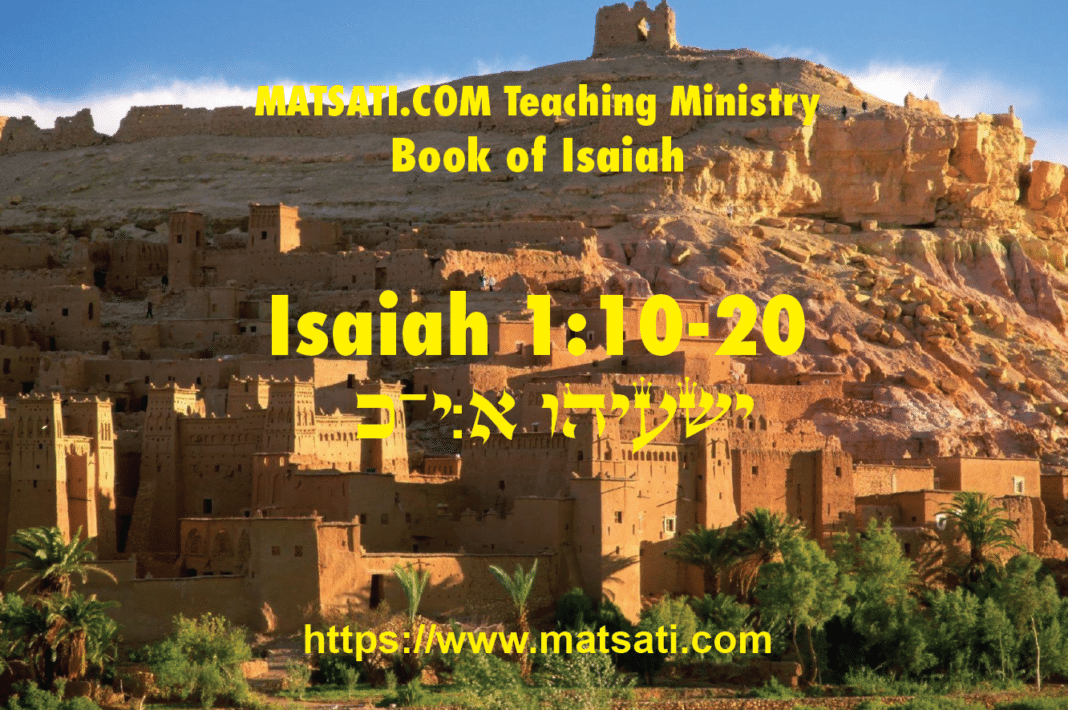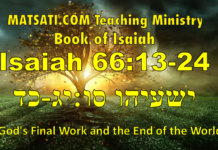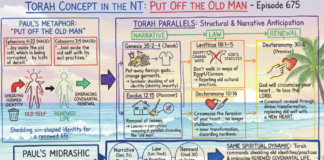Table of Contents
Introduction to Isaiah 1:10-20
ספר ישעיה פרק א
י שִׁמְעוּ דְבַר-יְהֹוָה קְצִינֵי סְדֹם הַאֲזִינוּ תּוֹרַת אֱלֹהֵינוּ עַם עֲמֹרָה:
Isaiah hears the word of the Lord and continues saying in Isaiah 1:10, “Hear the word of the Lord (שִׁמְעוּ דְבַר-יְהֹוָה), ye rulers of Sodom (קְצִינֵי סְדֹם); give ear unto the law of our God (הַאֲזִינוּ תּוֹרַת אֱלֹהֵינוּ), ye people of Gomorrah (עַם עֲמֹרָה).” Here Isaiah literally calls Israel, the people Sodom and Gomorrah. The Targum translates saying, קַבִילוּ פִתגָמָא דַיוי שִלטֹונַיָא דְעֹובָדֵיהֹון בִישִין כְשִלטֹונֵי סְדֹום אַצִיתוּ לְאֹורָיתָא דַאְלָהַנָא עַמָא דְעֹובָדֵיהֹון דָמַן לְעַם עְמֹורָה׃ 10 Hear ye the word of the Lord, ye rulers, whose works are evil, as of the rulers of Sodom; give ear to the law of our God, O people, whose works are evil like those of the people of Gomorrah. (TgJ) Jonathan interprets Isaiah’s words as still comparing the people to the evil works of Sodom and Gomorrah. On a spiritual level, the people are behaving like the inhabitants of Sodom and Gomorrah, but not just physically, spiritually also. Note the prophets words saying “give ear unto the law of our God” (הַאֲזִינוּ תּוֹרַת אֱלֹהֵינוּ) speaking of the significance of the Torah in the lives of God’s people. Notice the use of the word תּוֹרַת meaning “instruction” as opposed to “law.” Isaiah is calling the people to listen to the instruction of God, to His teaching for our lives as a covenant people! Note that this is not simply a call to the sacrificial system. The Lord God Almighty is not so much interested in sacrifice as He is in the moral, ethical, and merciful aspects of the Torah. Remember how the Rabbis speak of the Torah in terms of “opportunities to show grace” towards others. To claim that this is Isaiah’s call to a legalistic form of righteousness, is to do a disservice to what the Torah is all about. The Torah was not about man earning his salvation, or climbing his way to heaven via his own works. Unfortunately there were men who believed this was so, which is one of the major reasons Paul wrote his epistles, and it is even more unfortunate that today most still believe the Torah was a way for man to earn his salvation and way into heaven under the Mosaic covenant. When we study the Torah we learn how it speaks of faith, faithfulness, and the mercy of God! The Torah is about our attitudes and relationships, with both men and God. This truth is illustrated as Isaiah continues in his discourse on what exactly he means by “give ear unto the law of our God” (הַאֲזִינוּ תּוֹרַת אֱלֹהֵינוּ).
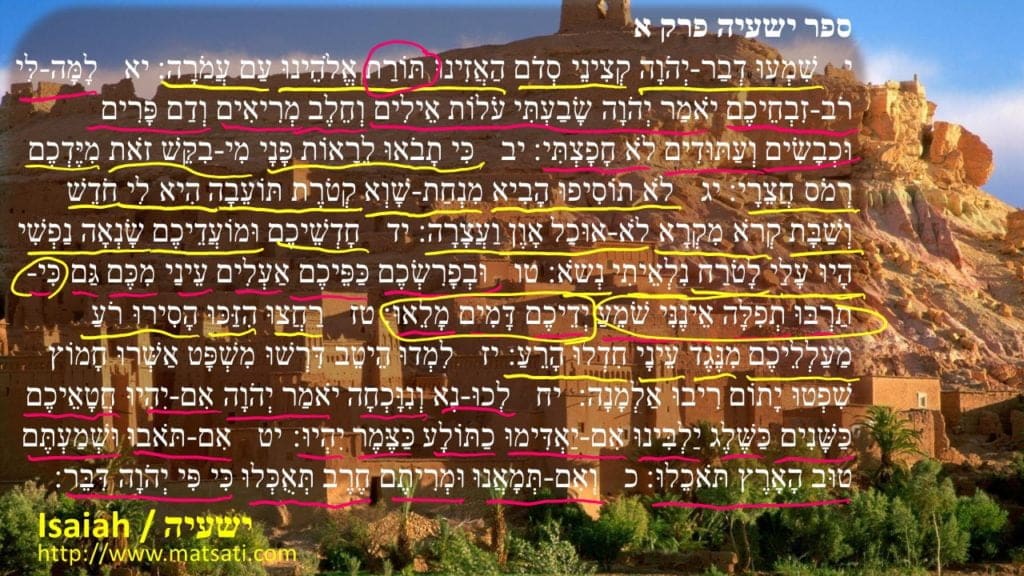
ספר ישעיה פרק א
יא לָמָּה-לִּי רֹב-זִבְחֵיכֶם יֹאמַר יְהֹוָה שָֹבַעְתִּי עֹלוֹת אֵילִים וְחֵלֶב מְרִיאִים וְדַם פָּרִים וּכְבָשִֹים וְעַתּוּדִים לֹא חָפָצְתִּי:
Isaiah 1:11 states, “To what purpose (לָמָּה-לִּי) is the multitude of your sacrifices unto me (רֹב-זִבְחֵיכֶם)? saith the Lord (יֹאמַר יְהֹוָה): I am full of the burnt offerings of rams (שָֹבַעְתִּי עֹלוֹת אֵילִים), and the fat of beasts; and I delight not (לֹא חָפָצְתִּי) in the blood of bullocks, or of lambs, or of he goats (וְחֵלֶב מְרִיאִים וְדַם פָּרִים וּכְבָשִֹים וְעַתּוּדִים).” Here the point is easily understood as Isaiah states, לָמָּה-לִּי רֹב-זִבְחֵיכֶם “to what purpose is the multitude of sacrifices to me?” The issue was that the people tended to always emphasize the physical and minimize the spiritual. The significance of this may be found in the epistles of Paul. One of the major themes of Paul was this very thing: we are saved and entered into a covenant by faith through the mercy / grace of God. This is a Torah centric principle! There are men however, even today, who believe and teach that the Torah was not about faith but about works! Take as an example what Paul writes according to Romans 10.
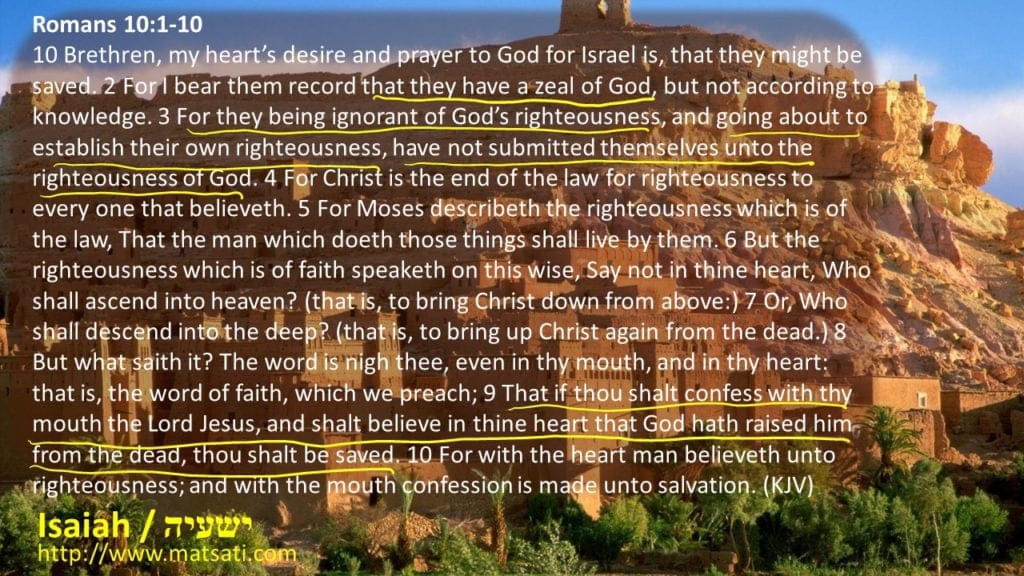
Romans 10:1-10
10 Brethren, my heart’s desire and prayer to God for Israel is, that they might be saved. 2 For I bear them record that they have a zeal of God, but not according to knowledge. 3 For they being ignorant of God’s righteousness, and going about to establish their own righteousness, have not submitted themselves unto the righteousness of God. 4 For Christ is the end of the law for righteousness to every one that believeth. 5 For Moses describeth the righteousness which is of the law, That the man which doeth those things shall live by them. 6 But the righteousness which is of faith speaketh on this wise, Say not in thine heart, Who shall ascend into heaven? (that is, to bring Christ down from above:) 7 Or, Who shall descend into the deep? (that is, to bring up Christ again from the dead.) 8 But what saith it? The word is nigh thee, even in thy mouth, and in thy heart: that is, the word of faith, which we preach; 9 That if thou shalt confess with thy mouth the Lord Jesus, and shalt believe in thine heart that God hath raised him from the dead, thou shalt be saved. 10 For with the heart man believeth unto righteousness; and with the mouth confession is made unto salvation. (KJV)
Paul was arguing for faith as opposed to works. We always note here the emphasis is on Romans 10:4 as the end of the Torah means “the goal or aim of” and not the termination of the Torah. The Hebrew text on Romans 10:4 (HNT) draws this out הֲרֵי הַמָּשִׁיחַ הוּא תַּכְלִית הַתּוֹרָה, כְּדֵי שֶׁיֻּצְדַּק כָּל מִי שֶׁמַּאֲמִין. With the word תַּכְלִית meaning “goal / aim” of the Torah is to direct us to the Messiah of God, Yeshua! The idea here is that the Torah teaches us to be loving towards our neighbor (Vayikra / Leviticus 19:18-19). God says through Isaiah, “the fat of beasts; and I delight not (לֹא חָפָצְתִּי) in the blood of bullocks, or of lambs, or of he goats (וְחֵלֶב מְרִיאִים וְדַם פָּרִים וּכְבָשִֹים וְעַתּוּדִים).” The point of the sacrifices was to demonstrate to the sinner the consequences of his or her sins, by the animal’s death. This is why Paul calls the Torah a schoolmaster that brings us to Christ. (Galatians 3:24) We notice how repentance was a major factor, as the one who brought the sacrifice would lay his hand upon the head of the animal and confess his sins before God. The very act of bringing a sacrifice was an act of repentance in obedience to God’s Word! This occurred not just for the individual, but also in the corporate worship and sacrifice illustrated in the festival of Yom Kippur. The days preceding Yom Kippur are the days of repentance. The Hebrew month of Elul is considered the start of the “Season of Repentance.” This season extends 40 days, from Elul 1 to Tishrei 10, the Day of Atonement (Yom Kippur). This is a solemn time of repentance and turning from sin prior to Yom Kippur. On Yom Kippur the Cohen Hagadol (High priest) confesses the sins of the people over the animals, including the one known as the azazel (scapegoat). (see Vayikra / Leviticus 16). To say repentance is unnecessary in the sacrificial ritual of the Tabernacle, is to demonstrate a significant lack of understanding of the teachings of the Torah! Note Solomon’s prayer of dedication to the temple emphasizes repentance and faith. We note the issues of ritual, which can lead one to believe they have been made right before God when bringing a sacrifice by rote. The idea here is that it is possible to continue to live unrepentant before God. Notice how this very same thing can happen by our faith in Yeshua! The point is 40% of the Torah deals with sacrifice, the Tabernacle, and the priesthood. These things are intimately connected with the motivation of devotion, of repentance, of a life lived in righteousness, holiness, justice, and truth. The undevoted sacrifice to the Lord was not acceptable, it was an abomination (Isaiah 1:13). This is what Isaiah was describing according to Isaiah 1:12-14.
ספר ישעיה פרק א
יב כִּי תָבֹאוּ לֵרָאוֹת פָּנָי מִי-בִקֵּשׁ זֹאת מִיֶּדְכֶם רְמֹס חֲצֵרָי: יג לֹא תוֹסִיפוּ הָבִיא מִנְחַת-שָׁוְא קְטֹרֶת תּוֹעֵבָה הִיא לִי חֹדֶשׁ וְשַׁבָּת קְרֹא מִקְרָא לֹא-אוּכַל אָוֶן וַעֲצָרָה: יד חָדְשֵׁיכֶם וּמוֹעֲדֵיכֶם שָֹנְאָה נַפְשִׁי הָיוּ עָלַי לָטֹרַח נִלְאֵיתִי נְשֹא:
Isaiah 1:12 “When ye come to appear before me (כִּי תָבֹאוּ לֵרָאוֹת פָּנָי), who hath required this (מִי-בִקֵּשׁ זֹאת) at your hand (מִיֶּדְכֶם), to tread my courts (רְמֹס חֲצֵרָי)?” Isaiah 1:13 “Bring no more vain oblation (לֹא תוֹסִיפוּ הָבִיא מִנְחַת-שָׁוְא); incense is an abomination unto me (קְטֹרֶת תּוֹעֵבָה הִיא לִי); the new moons and sabbath (חֹדֶשׁ וְשַׁבָּת), the calling of assemblies (קְרֹא מִקְרָא), I cannot away with (לֹא-אוּכַל); it is iniquity (אָוֶן), even the solemn meeting (וַעֲצָרָה).” Isaiah 1:14 “Your new moons (חָדְשֵׁיכֶם) and your appointed feasts (וּמוֹעֲדֵיכֶם) my soul hateth (שָֹנְאָה נַפְשִׁי): they are a trouble unto me (הָיוּ עָלַי לָטֹרַח); I am weary to bear them (נִלְאֵיתִי נְשֹא).” Based upon what Isaiah is saying here, the Lord is not happy with one who is not tamim (innocent) in his devotion to God. This isn’t about the offerings being not needed, but that they are being done in vain as the heart of those who bring the sacrifice are filled with inquiry and sin. Note that we are all sinners in need of salvation, mercy, grace, and forgiveness. The same with those here whom Isaiah is speaking tp. The issue is unrepentance, and the fundamental contradiction brought about by one bringing a sacrifice before God while remaining unrepentant. Even the sacrifice of Yeshua upon the cross is ineffectual without repentance! We cannot go before God in prayer, seeking forgiveness, and do so while leaving sin in our lives unchallenged and unchanged! Such a prayer God will not hear. (See Tehillim / Psalms 66:18) This is a matter of recognizing the error of our ways, and repenting, confessing that God is good, and we are not! Notice this is how John describes the Torah according to 1 John 3:3-10.
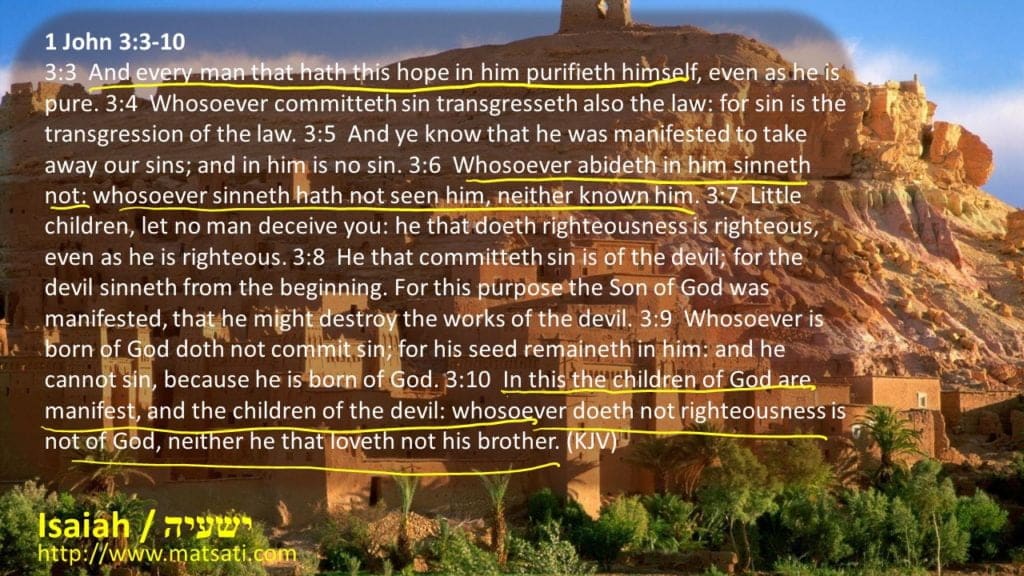
1 John 3:3-10
3:3 And every man that hath this hope in him purifieth himself, even as he is pure. 3:4 Whosoever committeth sin transgresseth also the law: for sin is the transgression of the law. 3:5 And ye know that he was manifested to take away our sins; and in him is no sin. 3:6 Whosoever abideth in him sinneth not: whosoever sinneth hath not seen him, neither known him. 3:7 Little children, let no man deceive you: he that doeth righteousness is righteous, even as he is righteous. 3:8 He that committeth sin is of the devil; for the devil sinneth from the beginning. For this purpose the Son of God was manifested, that he might destroy the works of the devil. 3:9 Whosoever is born of God doth not commit sin; for his seed remaineth in him: and he cannot sin, because he is born of God. 3:10 In this the children of God are manifest, and the children of the devil: whosoever doeth not righteousness is not of God, neither he that loveth not his brother. (KJV)
John speaks of this concept of purification. This is understood from the sense of turning from sin and walking in God’s ways of truth, righteousness, and holiness. This is a function of being faithful to God according to His Word! We note how the idea of continued iniquity is spoken of here in John’s interpretation of the Torah in conjunction with the life and testimony of Yeshua and the gospel message. John speaks of the one who has hope, purifies himself. This indicates that the faithful worshiper is looking to walk in God’s ways of holiness. John says that Yeshua was brought into this world to take away our sins (3:5) and the one who remains or abides in him does not sin. (3:6) John goes as far to say that the one who sins does not know Yeshua, or our Father in heaven. There is a spiritual aspect to sin, similar to what Paul wrote in Ephesians 2:2, saying that he who sins is of the evil one. (3:8) Yeshua was brought into this world to destroy the works of the devil, and so whoever is born of God does not sin! (3:9) This is how we know who we belong to, whether to God in righteousness, or to the evil one in unrighteousness. (3:10) These things ring true the words of Isaiah in terms of the fundamental contradiction between sin and righteousness. When one attempts to come before God with sin unchallenged and unchanged (unrepentant) this is something that is unacceptable, something God detests!
ספר ישעיה פרק א
טו וּבְפָרִשְֹכֶם כַּפֵּיכֶם אַעְלִים עֵינַי מִכֶּם גַּם כִּי-תַרְבּוּ תְפִלָּה אֵינֶנִּי שֹׁמֵעַ יְדֵיכֶם דָּמִים מָלֵאוּ:
Isaiah 1:15 states, “And when ye spread forth your hands (וּבְפָרִשְֹכֶם כַּפֵּיכֶם), I will hide mine eyes from you (אַעְלִים עֵינַי מִכֶּם): yea, when ye make many prayers (גַּם כִּי-תַרְבּוּ תְפִלָּה), I will not hear (אֵינֶנִּי שֹׁמֵעַ): your hands are full of blood (יְדֵיכֶם דָּמִים מָלֵאוּ).” These words remind us of David’s word according to Tehillim / Psalms 66:18 , אָ֭וֶן אִם־רָאִ֣יתִי בְלִבִּ֑י לֹ֖א יִשְׁמַ֣ע׀ אֲדֹנָֽי׃ If I regard iniquity in my heart, The Lord will not hear me (KJV) Note how these people are so filled up with sin, the Lord says though Isaiah, כִּי-תַרְבּוּ תְפִלָּה אֵינֶנִּי שֹׁמֵעַ “your many prayers I will not hear.” I’m fact, their hands are filled with blood, יְדֵיכֶם דָּמִים מָלֵאוּ, meaning they are murderers. Of such the Lord will not listen. What is displeasing to God is this unrepentant attitude. The reason is that one of the major themes in the Torah is centered on Repentance (Teshuvah)! The idea of the people’s hands being full of blood, דָּמִים מָלֵאוּ could this refer to their being murderers? This would mean these people are full of violence, consistent with the analogy of Sodom and Gomorrah. We are also told by Yeshia that if we keep hatred in our hearts it is like being a murderer. (Matthew 5:21-30, 1 John 3:15)
ספר ישעיה פרק א
טז רַחֲצוּ הִזַּכּוּ הָסִירוּ רֹעַ מַעַלְלֵיכֶם מִנֶּגֶד עֵינָי חִדְלוּ הָרֵע: יז לִמְדוּ הֵיטֵב דִּרְשׁוּ מִשְׁפָּט אַשְּׁרוּ חָמוֹץ שִׁפְטוּ יָתוֹם רִיבוּ אַלְמָנָה:
Isaiah 1:16 states “Wash you (רַחֲצוּ), make you clean (הִזַּכּוּ); put away the evil (הָסִירוּ רֹעַ) of your doings (מַעַלְלֵיכֶם) from before mine eyes (מִנֶּגֶד עֵינָי); cease to do evil (חִדְלוּ הָרֵעַ);” and Isaiah 1:17 “Learn to do well (לִמְדוּ הֵיטֵב); seek judgment (דִּרְשׁוּ מִשְׁפָּט), relieve the oppressed (אַשְּׁרוּ חָמוֹץ), judge the fatherless (שִׁפְטוּ יָתוֹם), plead for the widow (רִיבוּ אַלְמָנָה).” These words are very similar to what John wrote in 1 John 3:3 And every man that hath this hope in him purifieth himself, even as he is pure. (KJV) Note how Isaiah states that the people are to seek justice (דִּרְשׁוּ מִשְׁפָּט), this may be an indication of blood filled hands as being murderers. Verse 16 speaks of washing to make clean, and pitting away evil (הָסִירוּ רֹעַ), even to cease to do evil (חִדְלוּ הָרֵעַ). Is there such a thing as a ritualized method for putting away evil in one’s life? The Torah states the following according to Devarim / Deuteronomy 10:12-13.
ספר דברים פרק י
יב וְעַתָּה֙ יִשְׂרָאֵ֔ל מָ֚ה יְהוָ֣ה אֱלֹהֶ֔יךָ שֹׁאֵ֖ל מֵעִמָּ֑ךְ כִּ֣י אִם־לְ֠יִרְאָה אֶת־יְהוָ֨ה אֱלֹהֶ֜יךָ לָלֶ֤כֶת בְּכָל־דְּרָכָיו֙ וּלְאַהֲבָ֣ה אֹת֔וֹ וְלַֽעֲבֹד֙ אֶת־יְהוָ֣ה אֱלֹהֶ֔יךָ בְּכָל־לְבָבְךָ֖ וּבְכָל־נַפְשֶֽׁךָ׃ יג לִשְׁמֹ֞ר אֶת־מִצְוֺ֤ת יְהוָה֙ וְאֶת־חֻקֹּתָ֔יו אֲשֶׁ֛ר אָנֹכִ֥י מְצַוְּךָ֖ הַיּ֑וֹם לְט֖וֹב לָֽךְ׃
Note what the Masoretic text states, 12 And now, Israel, what doth the Lord thy God require of thee, but to fear the Lord thy God, to walk in all his ways, and to love him, and to serve the Lord thy God with all thy heart and with all thy soul, 13 To keep the commandments of the Lord, and his statutes, which I command thee this day for thy good? (KJV) The Lord’s expectation for us is to simply fear Him, and walk in His ways. Note Isaiah states, רַחֲצוּ הִזַּכּוּ הָסִירוּ רֹעַ “Wash you (רַחֲצוּ), make you clean (הִזַּכּוּ); put away the evil (הָסִירוּ רֹעַ)” the point is not that man is able to make himself clean before God, as we are all impure inside and out. This is how Isaiah describes us according to Isaiah 64:4, All of us have become like one who is unclean, and all our righteous acts are like filthy rags; we all shrivel up like a leaf, and like the wind our sins sweep us away. (NIV) The major point Isaiah is making here is to turn from evil, to walk away from the former life, and walk in God’s ways. This is the responsibility that we have which Isaiah is pointing out. We note again the Torah is not about a ritualized means for man to make atonement for himself earning his salvation. These things speak to direct us to a way of thinking, behaving, and living, that is in response to the call of God and His mercy / grace on our lives. This is consistent with what Isaiah states according to Isaiah 1:18-20.
ספר ישעיה פרק א
יח לְכוּ-נָא וְנִוָּכְחָה יֹאמַר יְהֹוָה אִם-יִהְיוּ חֲטָאֵיכֶם כַּשָּׁנִים כַּשֶּׁלֶג יַלְבִּינוּ אִם-יַאְדִּימוּ כַתּוֹלָע כַּצֶּמֶר יִהְיוּ: יט אִם-תֹּאבוּ וּשְׁמַעְתֶּם טוּב הָאָרֶץ תֹּאכֵלוּ: כ וְאִם-תְּמָאֲנוּ וּמְרִיתֶם חֶרֶב תְּאֻכְּלוּ כִּי פִּי יְהֹוָה דִּבֵּר:
Isaiah 1:18 “Come now (לְכוּ-נָא), and let us reason together (וְנִוָּכְחָה), saith the Lord (יֹאמַר יְהֹוָה): though your sins be as scarlet (אִם-יִהְיוּ חֲטָאֵיכֶם כַּשָּׁנִים), they shall be as white as snow (כַּשֶּׁלֶג יַלְבִּינוּ); though they be red like crimson (אִם-יַאְדִּימוּ כַתּוֹלָע), they shall be as wool (כַּצֶּמֶר יִהְיוּ).” Isaiah 1:19 “If ye be willing and obedient (אִם-תֹּאבוּ וּשְׁמַעְתֶּם), ye shall eat the good of the land (טוּב הָאָרֶץ תֹּאכֵלוּ).” Isaiah 1:20 “But if ye refuse (וְאִם-תְּמָאֲנוּ) and rebel (וּמְרִיתֶם), ye shall be devoured with the sword (חֶרֶב תְּאֻכְּלוּ): for the mouth of the LORD hath spoken it (כִּי פִּי יְהֹוָה דִּבֵּר).” Here we find the mercy of God by His turning our sins which are red like blood to snow (white) meaning that we are purified by His mercy. Notice how much the Lord values, rather than simply destroying us for our sins, he shows mercy, patience, and long suffering, calling us to repentance and to his righteous ways. Those righteous ways are to turn to truth and justice. Justice and truth are the character of God as He has revealed Himself to Israel and us according to the Torah. Remember how throughout the Torah and the Scriptures we read what Jeremiah states here in Jeremiah 30:22, וִהְיִ֥יתֶם לִ֖י לְעָ֑ם וְאָ֣נֹכִ֔י אֶהְיֶ֥ה לָכֶ֖ם לֵאלֹהִֽים׃ “You shall be My people, And I will be your God.” This is the final outcome of our relationship with God! This is why God expects us to live with certain moral and ethical behavior, because as His people we must be like this too. The point of the moedim and the sacrificial ritual was for remembering, for drawing near, for cultivating a relationship with God, for turning from the ways of the world, etc. The people of God are called to always have upon their hearts and minds the things of God.
Rabbinic Literature
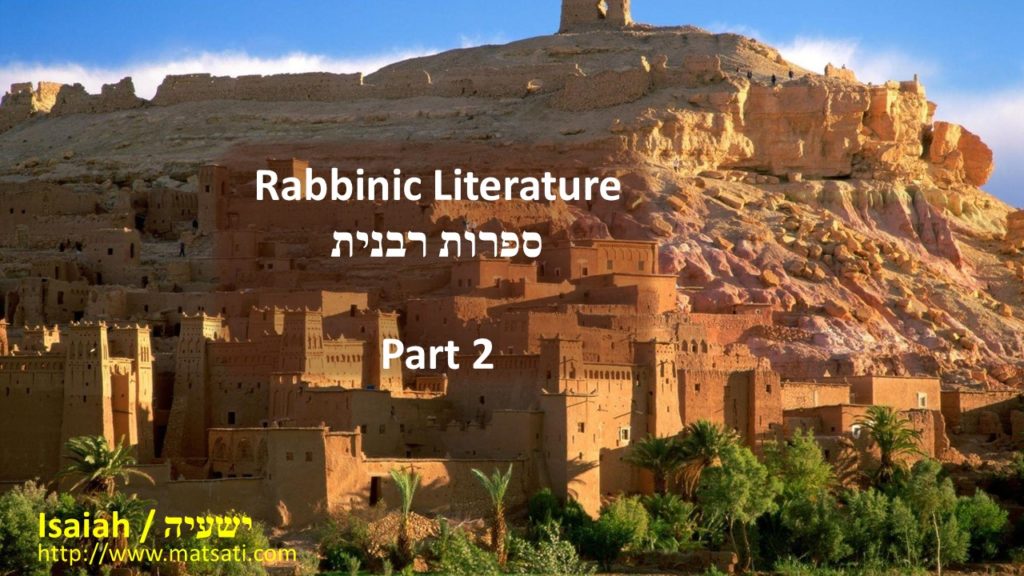
The Targum Jonathan could be considered a rabbinic translation of Isaiah, and so Johnathan translates Isaiah 1:10-20 in the following way:
תרגום יונתן בן עוזיאל אל ישעיה פרק א:י-כ
אִילוּ לָא פֹון מֹותַר טוּבֵיה דַיוי צְבָאֹות אַשאַר לַנָא שֵיזָבָא כְרַחֲמֹוהִי אִית עִימַנָא חֹובִין דִכאְנָש סְדֹום פֹון אְבַדנָא וּכיָתְבֵי עְמֹרָה אִשתֵיצִינָא׃ קַבִילוּ פִתגָמָא דַיוי שִלטֹונַיָא דְעֹובָדֵיהֹון בִישִין כְשִלטֹונֵי סְדֹום אַצִיתוּ לְאֹורָיתָא דַאְלָהַנָא עַמָא דְעֹובָדֵיהֹון דָמַן לְעַם עְמֹורָה׃ לָא רַעְוָא קֳדָמַי בְסַגִיאוּת נִכסַת קוּדשֵיכֹון אְמַר יוי מִיסַת עְלָווָת דִכרִין וּתרַב פַטִימִין וְדַם תֹורִין וְאִמְרִין וּגדִין דִכאִלֵין לָא רַעְוָא קֳדָמַי בְהֹון׃ דְאַתוּן אָתַן לְאִתַחזָאָה קֳדָמַי מַן תָבַע דָא מִיַדכֹון לְמֵיתֵי לָא תְדוּשוּן עַזרָתִי׃ לָא תֵיסְפוּן לְאֵיתָאָה מִנחָא אְנִיסָא קֻרבַן מְרַחַק הוּא קֳדָמַי יַרחִין וְשַבִין כְנֵישָא אַתוּן מִתכַנשִין לָא שָבְקִין חֹובֵיכֹון לְקַבָלָא צְלֹותְכֹון בְעִדָן כְנֵישָתְכֹון׃ יַרחֵיכֹון וְמֹועְדֵיכֹון רַחֵיק מֵימְרִי הְוֹו קֳדָמַי לְרִיחוּק אַסגִיתִי לְמִשבַק׃ וְכַד כָהְנַיָא פָרְסִין יְדֵיהֹון לְצַלָאָה עְלֵיכֹון מְסַלֵיקנָא אַפֵי שְכִינְתִי מִנְכֹון ואף כַד אַתוּן מַסְגַן לְצַלָאָה קדמי לָא רַעְוָא קֳדָמַי לְקַבָלָא צְלֹותְכֹון מִדִידֵיכֹון דַם זַכַי מַליָן׃ תוּבוּ לְאֹורָיתָא אִדַכֹו מֵחֹובֵיכֹון אַעדֹו בִישוּת עוּבָדֵיכֹון מִקֳבֵיל מֵימְרִי אִתמְנַעוּ מִלְאַבאָשָא׃ אֵילַפוּ לְאֵיטָבָא תְבַעוּ דִינָא זכֹו דַאְנִיס דִינוּ דִין יַתמָא עְבִידוּ קְבִילַת אַרמַלתָא׃ בְכֵין כַד תְתוּבוּן לְאֹורָיתָא תִבעֹון מִן קֳדָמַי וְאַעְבֵיד בָעוּתְכֹון אְמַר יוי אִם יְהֹון חֹובֵיכֹון כְתִימִין כְצִבעָנִין כְתַלגָא יַחוְרוּן אִם יִסמְקוּן כִזהֹורִיתָא כַעֲמַר נְקֵי יְהֹון׃ אִם תֵיבֹון וּתקַבְלוּן לְמֵימְרִי טוּבָא דְאַרעָא תֵיכְלוּן׃ וְאִם תְסָרְבוּן וְלָא תְקַבְלוּן לְמֵימְרִי בַחְרַב סָנְאָה תִתקַטלוּן אְרֵי בְמֵימְרָא דַיוי גְזִיר כֵין׃
Targum Jonathan ben Uziel on Isaiah Chapter 1:10-20
1:10 Hear ye the word of the Lord, ye rulers, whose works are evil, as of the rulers of Sodom; give ear to the law of our God, O people, whose works are evil like those of the people of Gomorrah. 1:11 I have no pleasure in the multitude of your holy sacrifices, saith the Lord: I am full with the abundance of the burnt offerings of rams, and the fat of fed beasts, and the blood of bullocks, and of lambs, and of he-goats; for in such I have no pleasure. 1:12 When ye come to appear before me, who has required this at your hand, and that ye should come? Tread not my courts; 1:13 Bring no more the oblation obtained by oppression; sacrifice is an abomination before me; the new moons and Sabbaths, the assembly ye are congregating, your sins shall not be forgiven, nor shall I hear your prayer at the time of your congregating yourselves together. 1:14 Your new moons and your appointed feasts my WORD hates; they are an abomination before me. I have often forgiven you. 1:15 When your priests are spreading out their hands to pray for you, I shall make to ascend the presence of my Shekinah from you; and when you are multiplying prayer, it is not my pleasure to accept your prayer at your hands, they being full of the blood of the innocent. 1:16 Return to the law; make you clean from your sins; put away the evil of your doings from before the presence of my WORD; cease to do evil; 1:17 Learn to do well; seek judgment; judge ye justice for him who is suffering violence; do justice to the orphan; hear ye the cry of the widow. 1:18 Then, when ye return to the law, ye shall pray before me, and I will grant your petition, saith the Lord. Though your sins be stained as with dye, they shall be white as snow; though they be red like crimson, they shall be pure as wool. 1:19 If ye be willing and obedient to my WORD, ye shall eat the good of the land. 1:20 But if ye refuse, and will not be obedient to my WORD, ye shall be slain with the sword of the enemy; for the WORD of the Lord has decreed it thus. (Targum)
Rashi opens in Isaiah 1:10 saying the following:
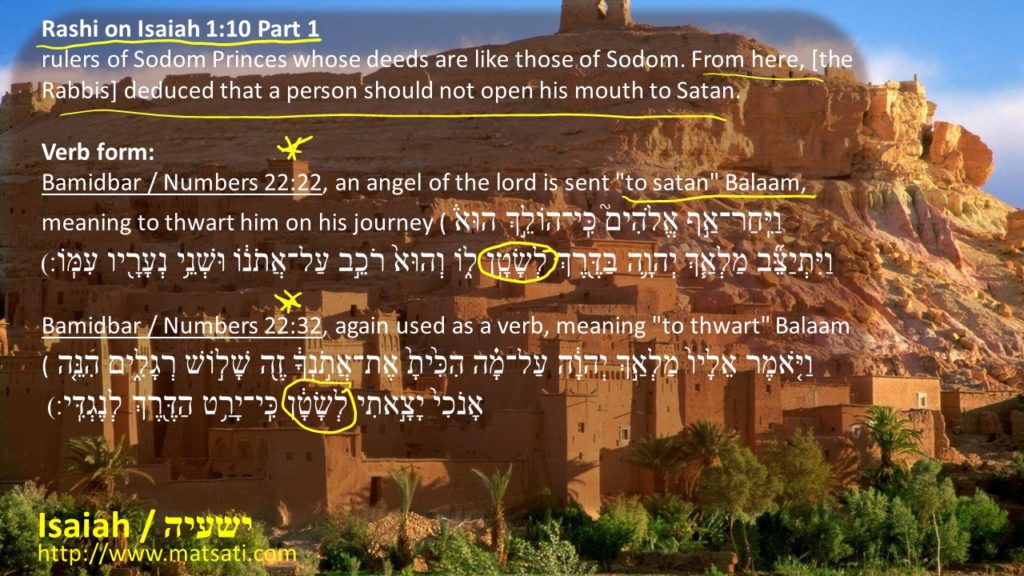
Rashi on Isaiah 1:10 Part 1
rulers of Sodom Princes whose deeds are like those of Sodom. From here, [the Rabbis] deduced that a person should not open his mouth to Satan.
The Targum translation expands upon Isaiah 1:10 in the following way saying, קַבִילוּ פִתגָמָא דַיוי שִלטֹונַיָא דְעֹובָדֵיהֹון בִישִין כְשִלטֹונֵי סְדֹום אַצִיתוּ לְאֹורָיתָא דַאְלָהַנָא עַמָא דְעֹובָדֵיהֹון דָמַן לְעַם עְמֹורָה׃ 10 Hear ye the word of the Lord, ye rulers, whose works are evil, as of the rulers of Sodom; give ear to the law of our God, O people, whose works are evil like those of the people of Gomorrah. (TgJ) Here Rashi concludes that a person should not open his mouth to Satan. The Hebrew word “satan” (שָּׂטָן) is transliterated here and means “adversary” and comes from a Hebrew verb meaning “to oppose” or “to obstruct.” In Jewish thought, one of the things Jews struggle against every day is the “evil inclination,” also known as the yetzer hara (יֵצֶר הַרַע, derived from Bereshit / Genesis 6:5). The yetzer hara is known as the evil inclination, it is not a force or a being, but rather refers to mankind’s innate capacity for doing evil in the world. The counterpart of the evil inclination is the “good inclination” called the yetzer ha’tov (יצר הטוב). In the Tanach, Satan appears as a proper being only twice in the whole of the Hebrew Bible, in the Book of Job and in the book of Zechariah (3:1-2). In both of these instances, the term that appears is ha’satan, with ha (ה) being the definite article “the.” This is meant to show that the terminology is referring to a person or being. According to the book of Job, Satan is depicted as an adversary who mocks the piety of a righteous man named Job (אִיּוֹב). He tells God that the only reason Job is so pieous or righteous is because God has given him a life filled with blessings. Satan claims “But lay Your hand upon all that he has, and he will curse You to Your face” (Job 1:11). God accepts Satan’s wager and allows Satan to rain all manner of misfortune upon Job. We read that his sons and daughters die, he loses his great wealth, and he is afflicted with painful boils. Yet though people and even his own wife tell Job to curse God, he refuses. In the Tanach, there are eight other references to satan, including two that use the terminology as a verb and the rest that use the term to refer to an “adversary” or “hindrance.”
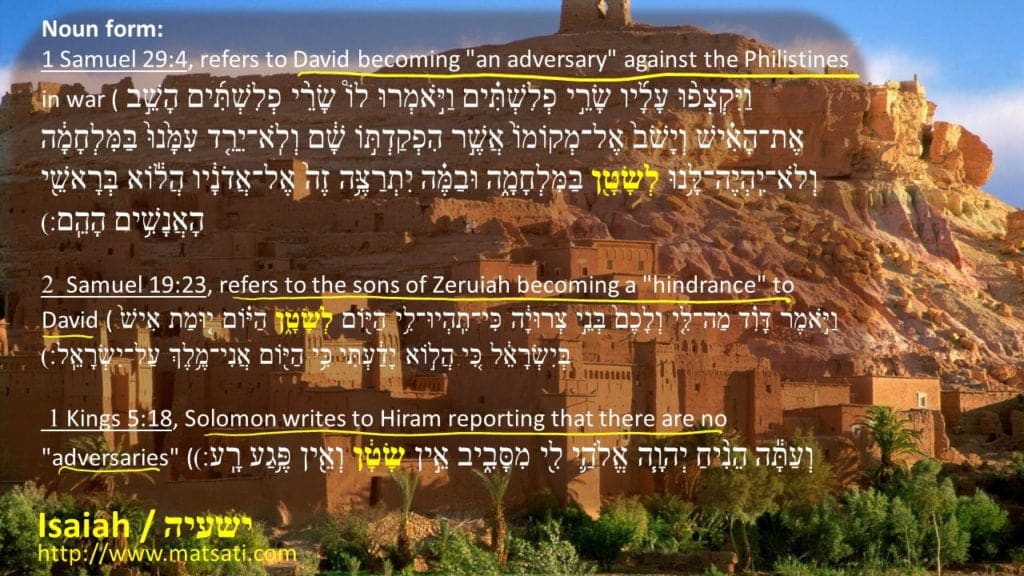

Verb form for Satan:
Bamidbar / Numbers 22:22, an angel of the lord is sent “to satan” Balaam, meaning to thwart him on his journey (וַיִּֽחַר־אַ֣ף אֱלֹהִים֮ כִּֽי־הוֹלֵ֣ךְ הוּא֒ וַיִּתְיַצֵּ֞ב מַלְאַ֧ךְ יְהוָ֛ה בַּדֶּ֖רֶךְ לְשָׂטָ֣ן ל֑וֹ וְהוּא֙ רֹכֵ֣ב עַל־אֲתֹנ֔וֹ וּשְׁנֵ֥י נְעָרָ֖יו עִמּֽוֹ׃)
Bamidbar / Numbers 22:32, again used as a verb, meaning “to thwart” Balaam (וַיֹּ֤אמֶר אֵלָיו֙ מַלְאַ֣ךְ יְהוָ֔ה עַל־מָ֗ה הִכִּ֙יתָ֙ אֶת־אֲתֹ֣נְךָ֔ זֶ֖ה שָׁל֣וֹשׁ רְגָלִ֑ים הִנֵּ֤ה אָנֹכִי֙ יָצָ֣אתִי לְשָׂטָ֔ן כִּֽי־יָרַ֥ט הַדֶּ֖רֶךְ לְנֶגְדִּֽי׃)
Noun form for Satan:
1 Samuel 29:4, refers to David becoming “an adversary” against the Philistines in war (וַיִּקְצְפ֨וּ עָלָ֜יו שָׂרֵ֣י פְלִשְׁתִּ֗ים וַיֹּ֣אמְרוּ לוֹ֩ שָׂרֵ֨י פְלִשְׁתִּ֜ים הָשֵׁ֣ב אֶת־הָאִ֗ישׁ וְיָשֹׁב֙ אֶל־מְקוֹמוֹ֙ אֲשֶׁ֣ר הִפְקַדְתּ֣וֹ שָׁ֔ם וְלֹֽא־יֵרֵ֤ד עִמָּ֙נוּ֙ בַּמִּלְחָמָ֔ה וְלֹא־יִֽהְיֶה־לָּ֥נוּ לְשָׂטָ֖ן בַּמִּלְחָמָ֑ה וּבַמֶּ֗ה יִתְרַצֶּ֥ה זֶה֙ אֶל־אֲדֹנָ֔יו הֲל֕וֹא בְּרָאשֵׁ֖י הָאֲנָשִׁ֥ים הָהֵֽם׃)
2 Samuel 19:23, refers to the sons of Zeruiah becoming a “hindrance” to David (וַיֹּ֣אמֶר דָּוִ֗ד מַה־לִּ֤י וְלָכֶם֙ בְּנֵ֣י צְרוּיָ֔ה כִּי־תִֽהְיוּ־לִ֥י הַיּ֖וֹם לְשָׂטָ֑ן הַיּ֗וֹם י֤וּמַת אִישׁ֙ בְּיִשְׂרָאֵ֔ל כִּ֚י הֲל֣וֹא יָדַ֔עְתִּי כִּ֥י הַיּ֖וֹם אֲנִי־מֶ֥לֶךְ עַל־יִשְׂרָאֵֽל׃)
1 Kings 5:18, Solomon writes to Hiram reporting that there are no “adversaries” (וְעַתָּ֕ה הֵנִ֨יחַ יְהוָ֧ה אֱלֹהַ֛י לִ֖י מִסָּבִ֑יב אֵ֣ין שָׂטָ֔ן וְאֵ֖ין פֶּ֥גַע רָֽע׃)
1 Kings 11:14, “And the Lord raised up an ‘adversary’ against Solomon, Hadad, the Edomite; he was of the royal lineage in Edom.” (וַיָּ֨קֶם יְהוָ֤ה שָׂטָן֙ לִשְׁלֹמֹ֔ה אֵ֖ת הֲדַ֣ד הָאֲדֹמִ֑י מִזֶּ֧רַע הַמֶּ֛לֶךְ ה֖וּא בֶּאֱדֽוֹם׃)
1 Kings 11:23, “And God raised up against (David) an ‘adversary,’ Rezon, the son of Eliada, who had fled from Hadadezer, the king of Zobah, his master.” (וַיָּ֨קֶם אֱלֹהִ֥ים לוֹ֙ שָׂטָ֔ן אֶת־רְז֖וֹן בֶּן־אֶלְיָדָ֑ע אֲשֶׁ֣ר בָּרַ֗ח מֵאֵ֛ת הֲדַדְעֶ֥זֶר מֶֽלֶךְ־צוֹבָ֖ה אֲדֹנָֽיו׃)
1 Kings 11:25, “And (Rezon) was an ‘adversary’ to Israel all of Solomon’s days with the evil that was caused by Hadad, and he detested Israel and ruled over Aram.” (וַיְהִ֨י שָׂטָ֤ן לְיִשְׂרָאֵל֙ כָּל־יְמֵ֣י שְׁלֹמֹ֔ה וְאֶת־הָרָעָ֖ה אֲשֶׁ֣ר הֲדָ֑ד וַיָּ֙קָץ֙ בְּיִשְׂרָאֵ֔ל וַיִּמְלֹ֖ךְ עַל־אֲרָֽם׃)
Tehillim / Psalms 109:6, “Set a wicked man over him, and let an ‘adversary’ stand at his right hand.” (הַפְקֵ֣ד עָלָ֣יו רָשָׁ֑ע וְ֝שָׂטָ֗ן יַעֲמֹ֥ד עַל־יְמִינֽוֹ׃)
1 Chronicles 21:1, “Now satan arose upon Israel, and he moved David to count Israel.” (וַיַּֽעֲמֹ֥ד שָׂטָ֖ן עַל־יִשְׂרָאֵ֑ל וַיָּ֙סֶת֙ אֶת־דָּוִ֔יד לִמְנ֖וֹת אֶת־יִשְׂרָאֵֽל׃)
Based upon these Scriptures, Judaism as a monotheistic faith, the rabbis resist the temptation to characterize anyone other than God with authority. Rather, God is the creator of both good and evil, and it is up to mankind to choose which path to follow. (see Isaiah 45:7) The NT text however speaks of Satan as a being, the devil, as the prince and power of the air, etc. (Ephesians 2:1-3) Satan is called a prince because he is a ruler and possesses power to manifest evil in the world through influencing people and commanding demons. “The air” in Ephesians 2:2 may refer to the invisible realm above the earth where Satan and his demons move, exist, and influence men for evil purposes. The source of evil is not attributed to Satan as in the sense of a creator. He (Satan) along with fallen angels or evil spirits are those at work to influence men to do evil. Every evil deed however is not necessarily the work of the devil, or Satan. The reason being, men are evil, and just as Isaiah describes according to Isaiah 1:10 Hear ye the word of the Lord, ye rulers, whose works are evil, as of the rulers of Sodom; give ear to the law of our God, O people, whose works are evil like those of the people of Gomorrah. (TgJ) These people as Isaiah says are corrupters, they function as l’satan (לְשָׂטָ֔ן, deceivers) in their own nature as a wicked people.

Talmud Bavli Berakhot 32b:3
In another comparison, Rabbi Elazar said: Prayer is greater than sacrifices, as it is stated: “To what purpose is the multitude of your sacrifices to Me, says the Lord. I am full of the burnt-offerings of rams and the fat of fed beasts; I do not desire the blood of bulls and sheep and goats” (Isaiah 1:11). And several verses later it is written: “And when you spread forth your hands I will hide My eyes from you, and even if you increase your prayer, I will not hear; your hands are full of blood” (Isaiah 1:15). Not only Israel’s sacrifices, but even their prayers, which are on a higher spiritual level, will not be accepted.
Talmud Bavli Chagigah 4b:7
Similarly, when Rav Huna reached this verse, he cried: “And you shall sacrifice peace-offerings, and you shall eat there” (Deuteronomy 27:7). Can it happen to a slave whose master expects him to eat at his table, that his master will eventually distance himself from him? As it is written: “To what purpose is the multitude of your offerings to Me? says the Lord” (Isaiah 1:11).
The rabbis derive their comments from Isaiah 1:11-12 which states the following, לָא רַעְוָא קֳדָמַי בְסַגִיאוּת נִכסַת קוּדשֵיכֹון אְמַר יוי מִיסַת עְלָווָת דִכרִין וּתרַב פַטִימִין וְדַם תֹורִין וְאִמְרִין וּגדִין דִכאִלֵין לָא רַעְוָא קֳדָמַי בְהֹון׃ 11 I have no pleasure in the multitude of your holy sacrifices, saith the Lord: I am full with the abundance of the burnt offerings of rams, and the fat of fed beasts, and the blood of bullocks, and of lambs, and of he-goats; for in such I have no pleasure. דְאַתוּן אָתַן לְאִתַחזָאָה קֳדָמַי מַן תָבַע דָא מִיַדכֹון לְמֵיתֵי לָא תְדוּשוּן עַזרָתִי׃ 12 When ye come to appear before me, who has required this at your hand, and that ye should come? Tread not my courts; (TgJ) Note how the rabbis say “prayer is greater than sacrifice.” Again, the issue is a matter of repentance, with the sacrifice bringing repentance due to the nature of the sacrifice, one lays his or her hand upon the animal and confesses sins before God. The significance of the peace offerings are to eat in the presence of God, to draw near and celebrate with others, including the slave. The issue being raised is on a master distancing himself from his slave due to his own sins. Notice how it is God who draws men together, even those in the master-slave relationship, there is a certain amount of respect and justice that is illustrated in the Shelamim korban (Peace offerings) according to the Torah. This is why Isaiah’s statement is so significant here when he said, “To what purpose is the multitude of your offerings to Me? says the Lord” (Isaiah 1:11) the question of one’s motivation or purpose to bring the sacrifice, whether it was out of rote, tor whether it was due to truly being repentant? This is the primary point the rabbis are making, saying the following.
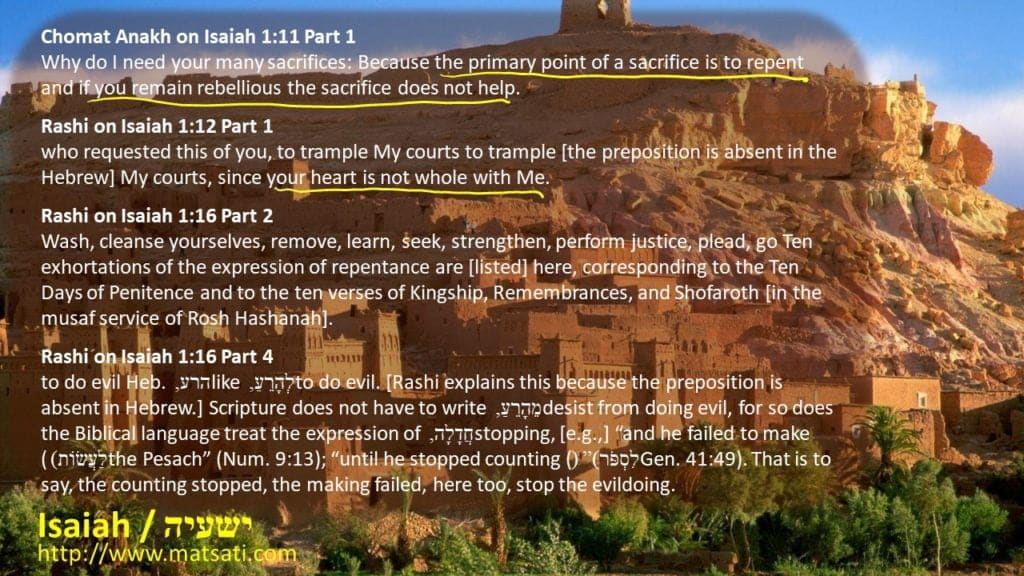
Chomat Anakh on Isaiah 1:11 Part 1
Why do I need your many sacrifices: Because the primary point of a sacrifice is to repent and if you remain rebellious the sacrifice does not help.
Rashi on Isaiah 1:12 Part 1
who requested this of you, to trample My courts to trample [the preposition is absent in the Hebrew] My courts, since your heart is not whole with Me.
The point of the sacrifice is to repent! Teshuvah (Repentance) requires the correct motivation, that one is whole-hearted towards the Lord. Isaiah 1:13 states, לָא תֵיסְפוּן לְאֵיתָאָה מִנחָא אְנִיסָא קֻרבַן מְרַחַק הוּא קֳדָמַי יַרחִין וְשַבִין כְנֵישָא אַתוּן מִתכַנשִין לָא שָבְקִין חֹובֵיכֹון לְקַבָלָא צְלֹותְכֹון בְעִדָן כְנֵישָתְכֹון׃ 13 Bring no more the oblation obtained by oppression; sacrifice is an abomination before me; the new moons and Sabbaths, the assembly ye are congregating, your sins shall not be forgiven, nor shall I hear your prayer at the time of your congregating yourselves together. (TgJ) here the people were lacking faith, believing their service by rote was sufficient. Again this reminds us of the Apostle Paul who instructed in his epistles to trust God by faith and not by works. When something is not done in faith, or the improper kavanah, it is of none-effect. Note that Kavanah is the Hebrew word for direction, intention, or purpose. In its simplest meaning, it refers to concentrating the mind in the performance of a religious act, ensuring that it doesn’t devolve into rote, mechanical action. Rashi goes on saying the following:
Rashi on Isaiah 1:16 Part 2
Wash, cleanse yourselves, remove, learn, seek, strengthen, perform justice, plead, go Ten exhortations of the expression of repentance are [listed] here, corresponding to the Ten Days of Penitence and to the ten verses of Kingship, Remembrances, and Shofaroth [in the musaf service of Rosh Hashanah].
Rashi on Isaiah 1:16 Part 4
to do evil Heb. הרע, like לְהָרֵעַ, to do evil. [Rashi explains this because the preposition is absent in Hebrew.] Scripture does not have to write מֵהָרֵעַ, desist from doing evil, for so does the Biblical language treat the expression of חֲדָלָה, stopping, [e.g.,] “and he failed to make (לַעֲשׂוֹת) the Pesach” (Num. 9:13); “until he stopped counting (לִסְפֹּר)” (Gen. 41:49). That is to say, the counting stopped, the making failed, here too, stop the evildoing.
Rashi describes cleansing one’s self as synonymous to removing sin from our lives, seeking God, strengthening our faith, and performing justice from the sense of pleading for those who need justice, i.e. the orphan and the widow. Rashi parallels these things to the Ten days of Repentance prior to Yom Kippur. The Targum translates Isaiah 1:16-18 in the following way, תוּבוּ לְאֹורָיתָא אִדַכֹו מֵחֹובֵיכֹון אַעדֹו בִישוּת עוּבָדֵיכֹון מִקֳבֵיל מֵימְרִי אִתמְנַעוּ מִלְאַבאָשָא׃ 16 Return to the law; make you clean from your sins; put away the evil of your doings from before the presence of my WORD; cease to do evil; אֵילַפוּ לְאֵיטָבָא תְבַעוּ דִינָא זכֹו דַאְנִיס דִינוּ דִין יַתמָא עְבִידוּ קְבִילַת אַרמַלתָא׃ 17 Learn to do well; seek judgment; judge ye justice for him who is suffering violence; do justice to the orphan; hear ye the cry of the widow. בְכֵין כַד תְתוּבוּן לְאֹורָיתָא תִבעֹון מִן קֳדָמַי וְאַעְבֵיד בָעוּתְכֹון אְמַר יוי אִם יְהֹון חֹובֵיכֹון כְתִימִין כְצִבעָנִין כְתַלגָא יַחוְרוּן אִם יִסמְקוּן כִזהֹורִיתָא כַעֲמַר נְקֵי יְהֹון׃ 18 Then, when ye return to the law, ye shall pray before me, and I will grant your petition, saith the Lord. Though your sins be stained as with dye, they shall be white as snow; though they be red like crimson, they shall be pure as wool. (TgJ) Here Jonathan expands upon Isaiah and speaks of turning from sin from the sense of returning to the Torah. Does this suggest that man earned his salvation under the Mosaic covenant? What exactly does it mean to return to the Torah? Is it the return to ritual, to sacrifice, that atones? Note that one is to have the correct kavanah, motivation, and repentance before a sacrifice becomes efficacious. The same thing applies to the sacrifice of our Messiah Yeshua and the efficaciousness of his death on our behalf. The rabbis believe that the point of the sacrifice is repentance before God! The process of repentance, as laid out by Maimonides, includes three stages, (i) confession, (ii) regret, and (iii) a vow not to repeat the misdeed. The truly penitent person, Maimonides says, is the one who finds himself with the opportunity to commit the same sin again yet declines to do so. There are two categories of sin in Jewish thought: (i) Sins against God: Ritual infractions, such as breaking the Sabbath or eating non-kosher food, and (ii) Sins against other people, i.e. theft or slander.
According to Jewish tradition, only sins against God can be atoned for through confession, regret and promising not to repeat the action. Sins against other people can be atoned for only once the wrong has been made right, restitution has been paid for a financial crime, for example, and forgiveness received from the victim. When thinking on these things concerning the Torah, the significance of returning to the Torah is the parallel to seeking the God of Israel, and His ways and turning from the ways of the world, and doing right by your neighbor. This is synonymous to asking the question “to whom shall we go?” The rabbis discuss this according to the Talmud Bavli Shabbat 89b.
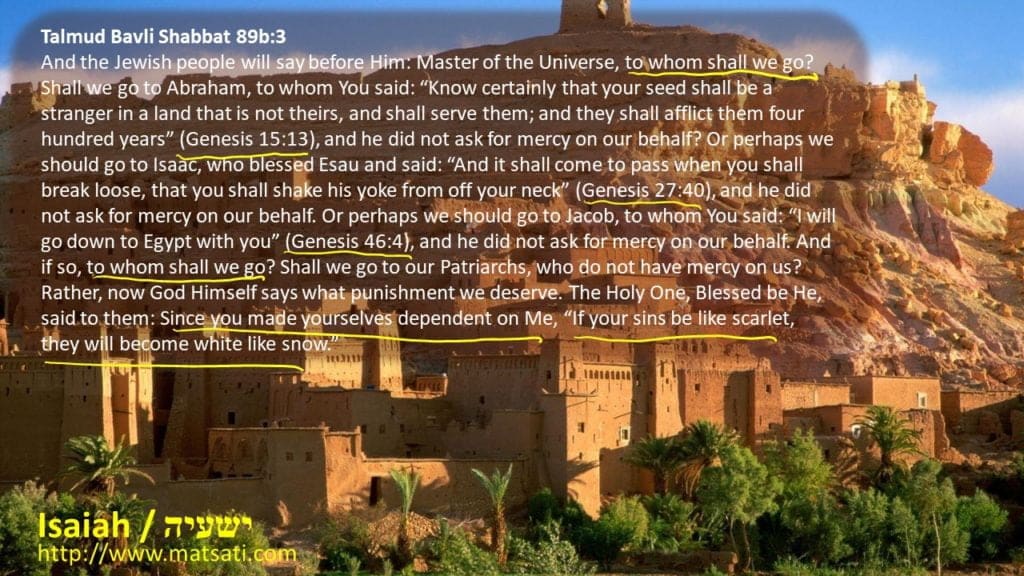
Talmud Bavli Shabbat 89b:3
And the Jewish people will say before Him: Master of the Universe, to whom shall we go? Shall we go to Abraham, to whom You said: “Know certainly that your seed shall be a stranger in a land that is not theirs, and shall serve them; and they shall afflict them four hundred years” (Genesis 15:13), and he did not ask for mercy on our behalf? Or perhaps we should go to Isaac, who blessed Esau and said: “And it shall come to pass when you shall break loose, that you shall shake his yoke from off your neck” (Genesis 27:40), and he did not ask for mercy on our behalf. Or perhaps we should go to Jacob, to whom You said: “I will go down to Egypt with you” (Genesis 46:4), and he did not ask for mercy on our behalf. And if so, to whom shall we go? Shall we go to our Patriarchs, who do not have mercy on us? Rather, now God Himself says what punishment we deserve. The Holy One, Blessed be He, said to them: Since you made yourselves dependent on Me, “If your sins be like scarlet, they will become white like snow.”
The rabbis discuss the idea of the people asking God to whom shall they go? The idea is turning to one who can lead them in the ways of God. They mention Abraham, Isaac, and Jacob and the afflictions they and their people had suffered. This idea of turning to one who may lead the people in the way of the Lord is a messianic expectation. A Messianic expectation in the Tanakh refers to the coming of the expected or the promised deliverer of Israel. The concept of the Messiah is central to Judaism. Also there exists in the World today a state of expectation, and hope of the imminent arrival of the Jewish World Saviour among many Jews, particularly members of the various Orthodox Sects of Judaism. There are many reasons why some believe that the time of the coming of the Messiah is at hand. Prophecies describing the role and actions that will be performed by the Messiah come from the book of Isaiah.
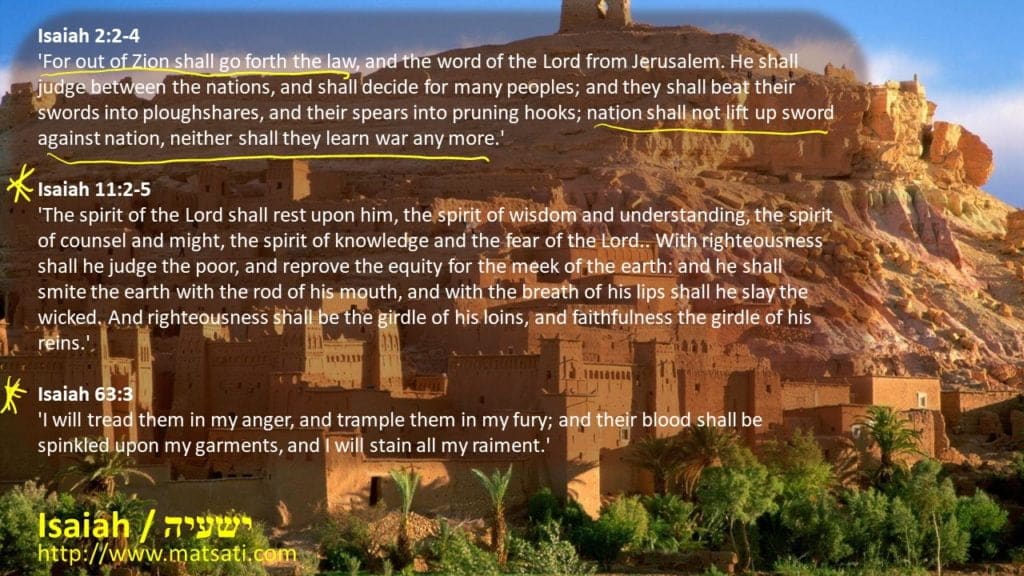
Isaiah 2:2-4
‘For out of Zion shall go forth the law, and the word of the Lord from Jerusalem. He shall judge between the nations, and shall decide for many peoples; and they shall beat their swords into ploughshares, and their spears into pruning hooks; nation shall not lift up sword against nation, neither shall they learn war any more.’
Isaiah 11:2-5
‘The spirit of the Lord shall rest upon him, the spirit of wisdom and understanding, the spirit of counsel and might, the spirit of knowledge and the fear of the Lord.. With righteousness shall he judge the poor, and reprove the equity for the meek of the earth: and he shall smite the earth with the rod of his mouth, and with the breath of his lips shall he slay the wicked. And righteousness shall be the girdle of his loins, and faithfulness the girdle of his reins.’
Isaiah 63:3
‘I will tread them in my anger, and trample them in my fury; and their blood shall be spinkled upon my garments, and I will stain all my raiment.’
When thinking upon the Messiah and his role of guiding the people in the ways of the Lord, along with a return to Torah, we are reminded of the conversation between the disciples and Yeshua. They ask the very same questions the rabbis do according to the Talmud Bavli Shabbat 89b.
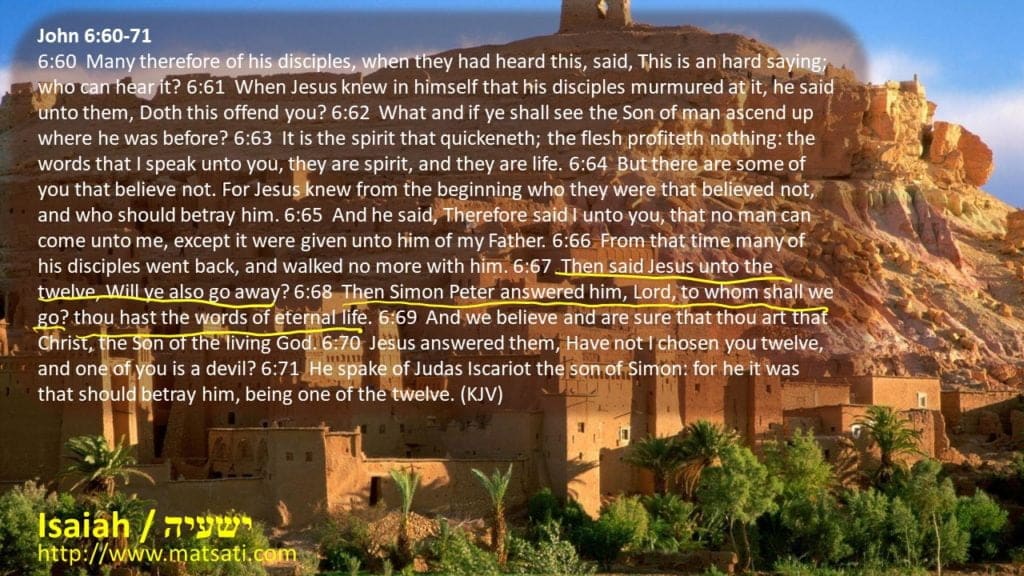
John 6:60-71
6:60 Many therefore of his disciples, when they had heard this, said, This is an hard saying; who can hear it? 6:61 When Jesus knew in himself that his disciples murmured at it, he said unto them, Doth this offend you? 6:62 What and if ye shall see the Son of man ascend up where he was before? 6:63 It is the spirit that quickeneth; the flesh profiteth nothing: the words that I speak unto you, they are spirit, and they are life. 6:64 But there are some of you that believe not. For Jesus knew from the beginning who they were that believed not, and who should betray him. 6:65 And he said, Therefore said I unto you, that no man can come unto me, except it were given unto him of my Father. 6:66 From that time many of his disciples went back, and walked no more with him. 6:67 Then said Jesus unto the twelve, Will ye also go away? 6:68 Then Simon Peter answered him, Lord, to whom shall we go? thou hast the words of eternal life. 6:69 And we believe and are sure that thou art that Christ, the Son of the living God. 6:70 Jesus answered them, Have not I chosen you twelve, and one of you is a devil? 6:71 He spake of Judas Iscariot the son of Simon: for he it was that should betray him, being one of the twelve. (KJV)
In John 6 Yeshua gives a very difficult teaching to the people. The teaching was so difficult in fact, that many of his disciples chose to leave and not follow him. Yeshua then asked his disciples whether they were going to leave too? John says, 6:66 From that time many of his disciples went back, and walked no more with him. 6:67 Then said Jesus unto the twelve, Will ye also go away? 6:68 Then Simon Peter answered him, Lord, to whom shall we go? thou hast the words of eternal life. (KJV) Here Peter recognized that Yeshua spoke the words of life. As God’s people we are called to seek truth, to walk in God’s Word, and follow in the footsteps of the Messiah. These words of Isaiah speak to the uniqueness of our creation, God creating us in His image, which gives us the opportunity to choose life or death. The point is what we read Isaiah saying according to Isaiah 1:19-20, אִם תֵיבֹון וּתקַבְלוּן לְמֵימְרִי טוּבָא דְאַרעָא תֵיכְלוּן׃ 19 If ye be willing and obedient to my WORD, ye shall eat the good of the land. וְאִם תְסָרְבוּן וְלָא תְקַבְלוּן לְמֵימְרִי בַחְרַב סָנְאָה תִתקַטלוּן אְרֵי בְמֵימְרָא דַיוי גְזִיר כֵין׃ 20 But if ye refuse, and will not be obedient to my WORD, ye shall be slain with the sword of the enemy; for the WORD of the Lord has decreed it thus. (TgJ) If we choose to walk with God, to walk in the footsteps of the Messiah, we will not walk in the way of the world! The call of Isaiah to the people is to turn from sin, to repent, and to seek the Lord God Almighty in His word and in His Messiah, the One who will lead us in God’s truth and life!
